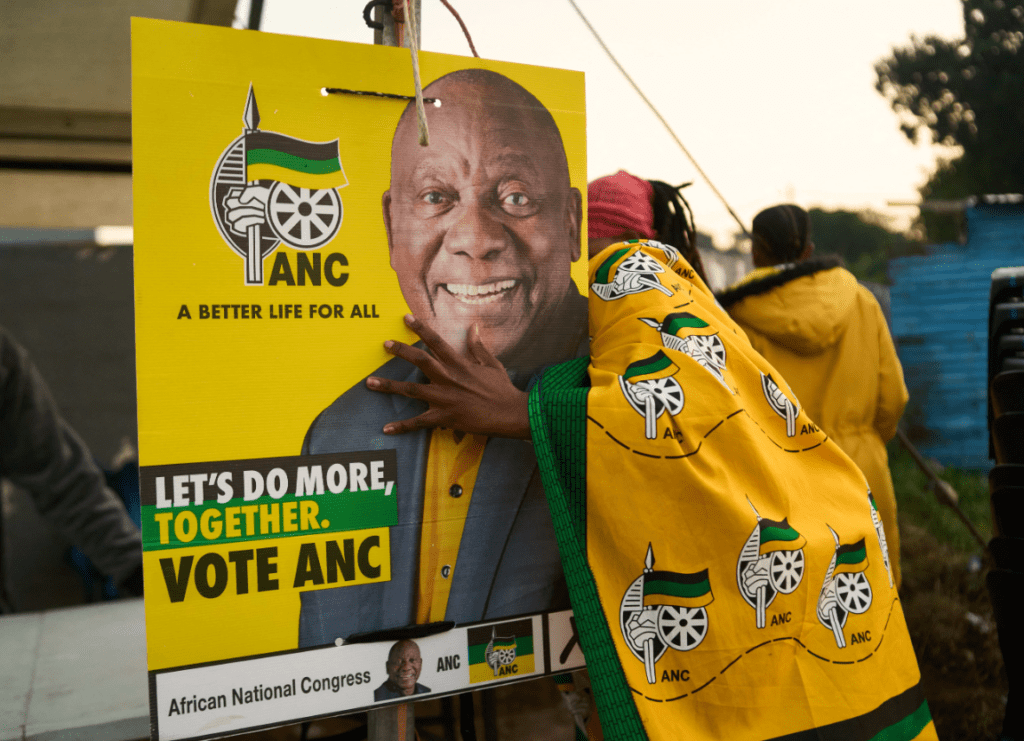Final results from Wednesday’s landmark South African elections have confirmed that the African National Congress (ANC) has lost its majority for the first time in 30 years of full democracy.
This development sets the stage for unprecedented coalition negotiations.
The ANC, historically significant for its role in ending apartheid, secured only 159 seats in the 400-member national assembly with just over 40% of the vote.
This significant decline in support is attributed to widespread issues such as high unemployment, frequent power outages, violent crime, and deteriorating infrastructure.
The Democratic Alliance (DA), a pro-business party, won 87 seats. uMkhonto weSizwe (MK), a new party led by President Cyril Ramaphosa’s rival and former president Jacob Zuma, secured 58 seats, while the Economic Freedom Fighters (EFF), a Marxist-Leninist party led by ousted ANC youth leader Julius Malema, garnered 39 seats.
The ANC also lost its majority in three key provinces: Northern Cape; Gauteng, which includes Johannesburg and Pretoria; and KwaZulu-Natal, where MK emerged as the largest party.
“What this election has made plain is that the people of South Africa expect their leaders to work together to meet their needs,” Ramaphosa stated to an audience of politicians, diplomats, and civil society leaders after the official results were announced, as thunder rumbled outside.
“They expect the parties for which they have voted to find common ground, to overcome their differences, to act and work together for the good of everyone.”
In a lighter moment, Ramaphosa joked about the electoral commission chairman’s accidental announcement of the 2029 election results, eliciting laughter from the crowd.
Despite the humor, serious questions loom about Ramaphosa’s future as the ANC faces the task of coalition building.
A spokesperson for Zuma’s MK party noted they had boycotted the election results event, echoing Zuma’s prior warnings against proceeding with the announcement, citing potential provocation.
Before the final results, ANC Secretary-General Fikile Mbalula made it clear that Ramaphosa’s position would not be negotiable in coalition discussions.
“If you come to us with a demand that Ramaphosa must step down as the president, that is not going to happen … It’s a no-go area. You come to us with that demand, forget it,” he asserted at a press conference.
MK leaders have declared they will not collaborate with the ANC while Ramaphosa remains in charge.
Zuma, who led South Africa from 2009 to 2018 before resigning amid corruption allegations, is determined to oppose Ramaphosa.
The ANC, now at its weakest since taking power in 1994 under Nelson Mandela, is exploring various coalition options.
A potential alliance with the DA might appeal to the ANC’s business-friendly faction, although it risks backlash from black South Africans who perceive the DA as prioritizing white interests.
Incorporating a third black-led party could mitigate such criticisms.
The DA has indicated openness to a coalition or a “confidence and supply” arrangement with an ANC minority government while staying in opposition.
Another possible coalition partner for the ANC is the EFF, a choice likely favored by the party’s left wing.
]However, this would still require additional partners to achieve a majority, such as the Inkatha Freedom Party (IFP), which secured 17 seats and, like MK, draws substantial support from Zulu people.
MK has demanded a recount, alleging vote rigging without substantiation.
Zuma’s comments at the results center heightened concerns of potential unrest, reminiscent of the deadly riots following his imprisonment in 2021.
The constitution mandates that parliament must convene within 14 days of the final election results to elect a president during its first session.
Driver Who Assaulted Traffic Police Arrested In Operation In Jacaranda, Kayole
